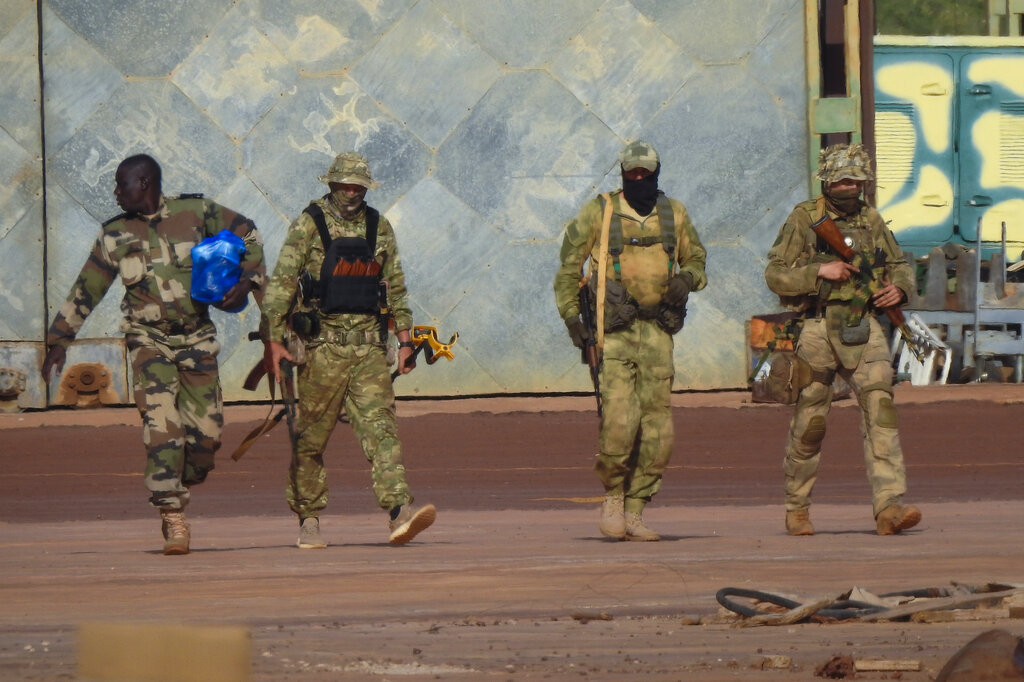ADF STAFF
Five days after leading a failed uprising against the Russian state, Yevgeny Prigozhin and his top Wagner Group officers sat face-to-face with Russian President Vladimir Putin for a three-hour meeting on June 29.
Despite having called his former close advisor a traitor and vowing harsh punishment, Putin reportedly gave immunity to Wagner personnel. He also agreed to let Prigozhin keep some of his vast, shadowy empire in Africa.
Rama Yade, senior director of the Atlantic Council’s Africa Center, is one of many observers still trying to make sense of the mutiny and its fallout.
“Undoubtedly this rebellion will impact the African theater, particularly Mali, Central African Republic (CAR), Libya, and Sudan where Wagner has settled its troops,” she said on the think tank’s website.
“Whereas until now the interests of the Russian government and the Wagner group aligned, it will now be necessary for these countries to do business with two Russian actors with rival interests. This rivalry will put their African allies in an awkward position.”
Experts don’t know exactly what is to come for the mercenary organization that was Russia’s favorite proxy for spreading influence and smuggling natural resources. But they know Putin is committed to maintaining control of Wagner’s highly profitable operations in Africa.
“Wagner will stay in Africa, that’s for sure,” Sergei Markov, a political consultant with close ties to the Kremlin, told Bloomberg News. “But whom it will report to, Prigozhin or another oligarch, has yet to be decided.”
Several hundred Wagner fighters reportedly left the CAR recently, as witnesses said some sold possessions that would indicate they will not return.
Although the CAR government on July 8 labeled the movements a rotation and “not a definitive departure,” several hundred Wagner troops arrived in Belarus days later.
A Belarusian activist group reported that a convoy of more than 100 vehicles with Wagner insignia traveled on July 17 from Russia to a field camp set up for the mercenaries by Belarusian authorities. It was one of three convoys that arrived in one week.
Regardless of whether Russia pulls Wagner under the umbrella of its military, exiles Prigozhin to Belarus, shifts the group to another leader, or rebrands it, countries in Africa are likely to experience the same tactics that include violence directed at civilians, looting of natural resources and state-capture.
Alia Brahimi, an Atlantic Council expert on mercenaries, said Prigozhin’s deep ties to Wagner’s military and business personnel on the continent would make for some hard choices if the mercenary group were divided.
“They [Wagner commanders in Africa] will have to reconcile the personal debt they owe to Prigozhin and their tribal identity as private operatives rather than public soldiers with more centralized Kremlin control,” she told The Guardian newspaper.
“From the Kremlin’s side, the whole point and draw of letting Wagner off the leash in Africa was that they were a deniable force. Now the horrific crimes and abuses, as well as the economic predation, will have a clear return address.”
In carrying out Russia’s foreign policy objectives, Wagner has established a labyrinth of proxies and shell companies that conduct misinformation campaigns for authoritarian African regimes while extracting precious natural resources.
Huge amounts of cash and contraband have been sent back to Russia, helping the country fund its war on Ukraine while withstanding international sanctions.
But Wagner mercenaries in Africa also have been accused of widespread atrocities and human rights abuses in several countries.
A change in Wagner’s leadership likely would not change the deadly status quo in Africa, said Charles Bouessel, International Crisis Group senior analyst on the CAR.
“I think it won’t change substantially the method of accountability with Wagner, the activities will be certainly maintained in this kind of form,” he told Al-Jazeera.
“Whether it is Prigozhin or another war entrepreneur, it does not really matter. It is more about who is going to control the company.”
Enrica Picco, Crisis Group’s CAR project director, believes Wagner’s holdings were built to withstand turbulence.
“With Wagner, Russia has managed to create a very powerful business machine and tool for influence in Africa,” she told Bloomberg. “So the system will not fail even if there are internal struggles in Russia.
“The Kremlin will not let the system fail — it’s too important for them.”

